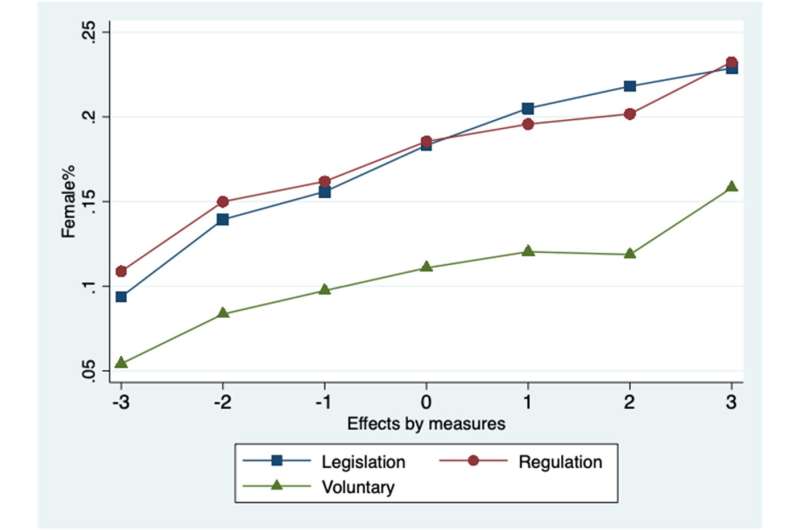This article has been reviewed according to Science X's editorial process and policies. Editors have highlighted the following attributes while ensuring the content's credibility:
fact-checked
trusted source
proofread
'Soft laws' see more women in the boardroom

So-called "soft laws", such as agreements, principles and declarations, are effective in getting more women represented on corporate boards across the world, according to new research by Anglia Ruskin University (ARU).
The study, published in the International Journal for the Economics of Business, examined the effectiveness of soft laws in promoting board diversity in more than 14,000 companies across 99 nations between 2000 and 2021.
Soft laws are non-legally binding codes, commitments or policies that may be used by nations to achieve certain goals such as increasing the diversity of an organization.
Companies not complying may be hit by sanctions such as fines, lawsuits or refilling, which is where non-compliant firms must leave a vacancy empty until a woman is found to fill the role.
The new ARU study found that the average percentage of women on corporate boards is 20% in firms in jurisdictions with relevant soft laws, and 11% in firms not bound by these soft laws. Researchers found that precise rule-based approaches, with less ambiguity, were more likely to be effective in achieving their aims.
Quotas, which is where a company is required to have a certain number or percentage of women on its board, were found to increase the presence of female directors by 11.7%. However, these quotas were only found to be effective when sanctions were applied to firms who did not comply.
Firms were more likely to comply with policies when they had more time to implement them, and when the targets were not radically different to existing levels of board diversity.
According to Deloitte, France is the country with the highest percentage of board seats held by women, at approximately 43%. However, among countries with no legal mandate, Sweden is the highest with approximately 35%. In contrast, in Qatar just 1.2% of board seats are held by women.
Lead author Dr. Wei Kang, Lecturer in the School of Economics, Finance and Law at Anglia Ruskin University (ARU), said, "We know from previous research that enhanced gender diversity in the boardroom provides firms with a wealth of benefits, including driving strategic change, promoting fair earnings, and driving sustainability.
"Our findings suggest that some forms of soft laws introduced by countries to increase diversity in the boardroom do work, but they have varying levels of success. It appears that clear, strict rules do have more of an effect, and sanctions encourage firms to adhere by these rules.
"However, we also found that firms appeared to be more compliant when targets were realistic and there was sufficient time to get their house in order."
More information: Wei Kang et al, Realizing Gender Diversity on Corporate Boards, International Journal of the Economics of Business (2022). DOI: 10.1080/13571516.2022.2133337
Provided by Anglia Ruskin University



















